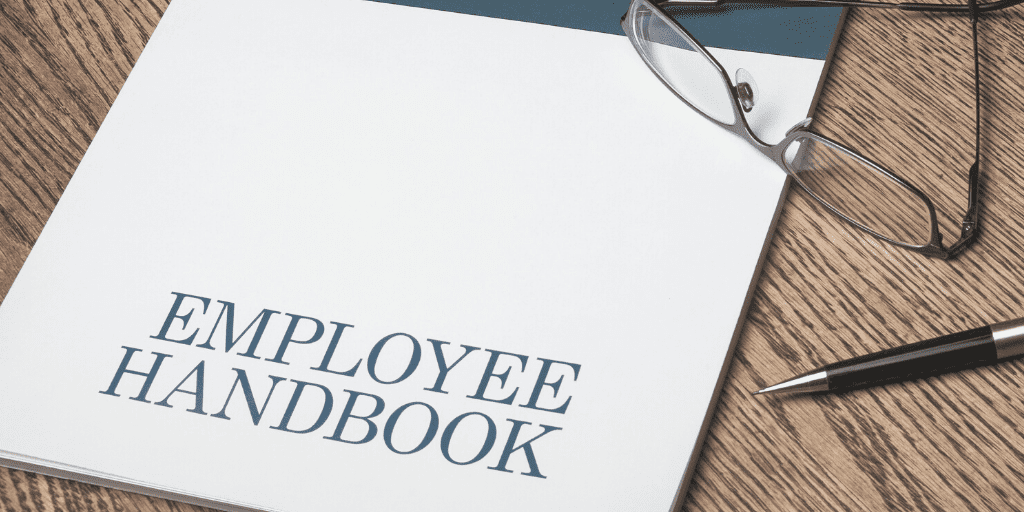In today’s dynamic HR landscape, the employee handbook plays a vital role within organizations.
Beyond being a repository for important company policies, it serves as a guide and roadmap for employees as they navigate their journey within your organization.
As we step into the new year, it is important to ensure that your 2024 employee handbook is not only in compliance with current labor laws but also relevant to workplace trends and aligned with your company’s vision and values.
In this article, we’ll explore key policies to review and important updates to incorporate so that your employee handbook remains compliant, reflects the culture and values of your organization, and continues to serve as a valuable tool for your workforce in 2024.
Key Areas for Review in 2024
Work Arrangement Policies
In the last two years, companies have been reassessing their approaches to work arrangements. Some once-remote organizations have started to return employees to the office, while others have responded to employee demands by providing greater flexibility.
Whether transitioning back to the office, adopting a hybrid model, or fully embracing remote work and flexibility, it’s essential to establish a clear structure for these policies. Clearly outline expectations, communication protocols, and performance evaluation criteria for your organization’s chosen work model and ensure that employees have a solid understanding of these policies.
Social Media Policies
In light of the National Labor Relations Board’s recent Stericycle, Inc. ruling, social media and communication policies are among those that may need to be rephrased to ensure they do not infringe upon employee’s Section 7 rights. Employers should encourage responsible social media practices but refrain from using definitive terms such as always, must, or never, which can be construed as restricting employee rights.
For additional guidance on which policies may need to be reevaluated under the Stericycle ruling, refer to our recent article.
Paid Sick Time and Leaves
Although there is currently no federal sick leave law in place, more than a dozen states across the country have instituted mandatory paid sick leave laws. These states include, among others, Connecticut, Maryland, New Jersey, New York, Rhode Island, and Washington D.C. Employers should verify that their policies align with the specific sick leave laws of the states in which they operate, particularly if they have employees in multiple states.
Apart from mandatory paid sick leave laws, several states also require employers to provide paid family and medical leave, including Delaware, Maryland, New Jersey and New York. Make sure your employee handbook is in compliance with the mandated leave laws of your state.
Drug Policies
Considering the rapidly changing landscape of marijuana regulations nationwide, employers need to carefully review their drug policies to protect employee rights and promote a safe and respectful workplace.
It is important to note that even if marijuana is legalized for recreational or medical purposes, employers maintain the authority to establish explicit policies prohibiting its use in the workplace and impacting performance during work. Clear communication of expectations regarding marijuana and other drug use is essential, especially in safety-sensitive positions such as those involving heavy machinery and transportation.
Pay Transparency
In the past few years, an increasing emphasis has been placed on pay transparency as states and cities nationwide seek to address longstanding pay disparities in the workplace. States such as California, Colorado, Washington, and New York require employers to include pay ranges within job listings, while others prohibit asking about an employee’s previous salary.
To align with the evolving landscape, employers should review and update their pay transparency policies. It is essential to ensure compliance with state requirements and to stay in step with the current trends shaping attitudes toward transparency in compensation. This can not only help organizations adhere to state requirements but also reflects a commitment to fostering equitable and transparent workplaces. It is advisable to consistently include salary ranges in position advertisements, whether it is mandatory or not.
For more insights on incorporating pay transparency in your organization, check out our article here.
Pregnancy and Reasonable Accommodations
With the enactment of the Pregnant Workers Fairness Act (PWFA), it is important that employers carefully review and update their handbooks to incorporate a policy addressing pregnancy accommodations. This involves providing detailed information on leave options, accommodation procedures, and support mechanisms specifically tailored for expectant mothers.
It is important to note that the PWFA does not replace more protective federal, state, or local laws for workers affected by pregnancy, childbirth, or related medical conditions.
In addition to a policy addressing the PWFA, employers should ensure clarity in their ADA policy and provide training to managers, so they know how to identify and process a request for reasonable accommodation, whether pregnancy-related or not.
Technology and AI
With the increasing prevalence of AI in the workplace, employers may want to consider implementing policies regarding its use. These policies should clearly define whether your company permits, restricts, or prohibits the use of AI in the workplace, and establish rules and procedures for its appropriate use. Explicitly address any security risks specific to your business and consider specifying which AI platforms are permitted.
A Trusted HR Advisor
The policies listed above are not comprehensive, and your company may need to examine additional policies. For help reviewing and updating your employee handbook, contact us today.



